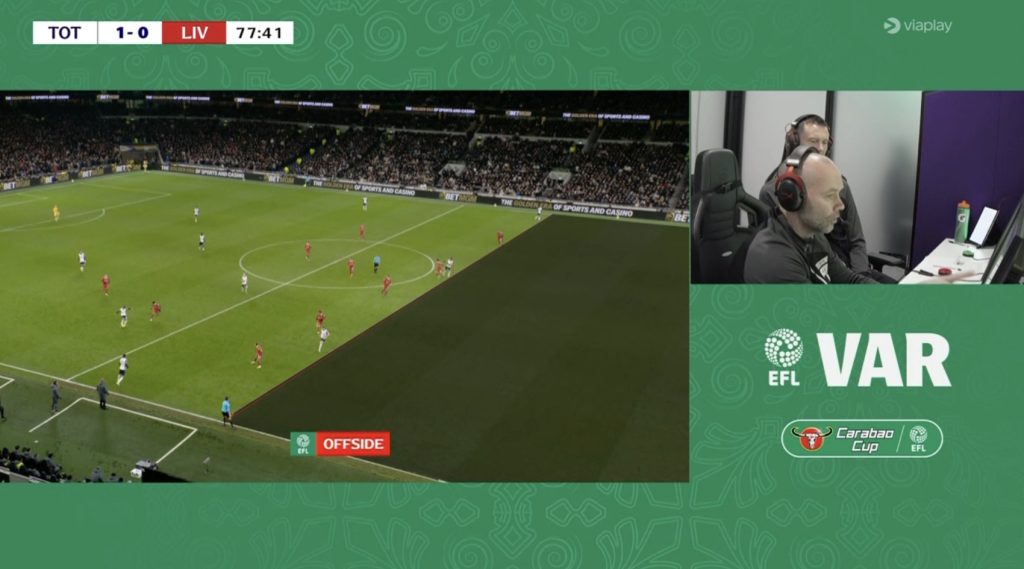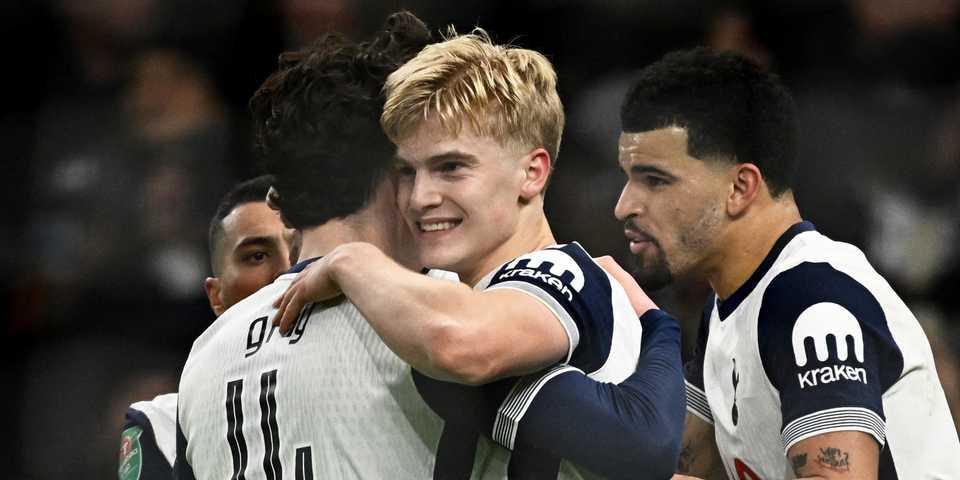Ange Postecoglou defended referee Stuart Attwell’s contentious decision not to issue a second yellow card to Lucas Bergvall during Tottenham’s Carabao Cup semi-final victory over Liverpool.
However, a VAR expert later clarified why Liverpool had every right to feel aggrieved. Bergvall’s decisive 86th-minute goal sealed a 1-0 win for Tottenham, but the controversy surrounding his presence on the pitch overshadowed the match.
The young Swedish midfielder, already booked earlier for a sliding challenge on Luis Diaz, found himself at the center of a storm when he committed another foul on Kostas Tsimikas in the build-up to his goal.
Replays of the earlier booking showed minimal contact, but the second challenge on Tsimikas drew widespread criticism. Tsimikas, absent from the decisive play while recovering on the sidelines, left Liverpool even more frustrated, as the referee opted against further action against Bergvall. Adding to the tension, a member of Liverpool’s coaching staff received a booking for their protest on the touchline.
Speaking to Sky Sports after the match, Postecoglou staunchly defended Attwell’s decision, insisting the referee had interpreted the rules correctly. “No, he wasn’t. No, he wasn’t!” Postecoglou said when asked if Bergvall was fortunate to remain on the field. He added, “The rule, as we’ve been told for quite a while, states that if advantage is played, and the tackle isn’t cynical, it doesn’t warrant a yellow card.” This interpretation, however, sparked significant debate, particularly among VAR analysts and fans.

Dale Johnson, a VAR expert and ESPN editor, took to social media platform X to provide his professional assessment of the situation. Johnson firmly stated, “That should have been a second yellow for Lucas Bergvall.”
He explained that Bergvall’s challenge constituted a reckless tackle, an offense that should have led to an immediate second booking, regardless of the perceived advantage.
Johnson dissected Postecoglou’s defense, identifying three critical errors in the Tottenham manager’s interpretation of the rulebook. Firstly, Johnson clarified that Bergvall’s foul was not about stopping a promising attack (SPA) but was instead categorized as a reckless tackle, which warrants a yellow card irrespective of the context.
Secondly, he pointed out that advantage should not apply to a second yellow card unless an immediate goal-scoring opportunity arises. Lastly, Johnson noted that Attwell did not indicate he had played advantage during the incident, as he seemed to suggest Bergvall won the ball, which was incorrect.
Further elaborating on the nuances of the rules, Johnson explained that referees are not permitted to apply advantage when a second yellow card is warranted. Even if Attwell had viewed the challenge as stopping a promising attack, the rules mandate that play must stop, and the second yellow card must be shown.
Johnson also highlighted that Attwell’s apparent gesture, pointing at the ball during the challenge, added to the confusion. This action suggested the referee believed Bergvall’s tackle was fair, contradicting the criteria for a reckless foul.
In his detailed analysis, Johnson explained that referees have some discretion when considering fouls that are careless, as these do not carry a yellow card sanction.
However, for fouls deemed reckless or categorized under SPA, the referee has no latitude to apply advantage. Bergvall’s challenge, which clearly fell under the reckless category, should have resulted in his dismissal under these guidelines.
The aftermath of the match has reignited the ongoing debate over VAR and refereeing consistency in high-stakes matches. Liverpool manager Arne Slot expressed his frustration with the situation, and the decision not to dismiss Bergvall has added to a growing list of contentious moments in the use of technology in football.
For Liverpool, the sense of injustice was compounded by the timing and impact of Bergvall’s goal, which ultimately decided the match.
As discussions about the incident continue, it raises broader questions about the application of rules and the responsibility of officials to ensure clarity and consistency. While Postecoglou defended his player and the referee, experts like Johnson have shed light on the complexities of officiating and the critical need for adherence to established guidelines.
For Liverpool, the focus will now shift to overturning the deficit in the second leg. However, the fallout from this incident may have lasting implications, both for how VAR decisions are handled and for the reputation of the officiating team involved in this high-profile fixture.
For Tottenham, despite the controversy, the result places them in a strong position to secure a spot in the Carabao Cup final, a significant achievement for Postecoglou’s team.


I find it amazing Liverpool. Fans are complains about a decision not going their way after the Champions League Final in Madrid.
This was decided by a much worse’s refereeing decision